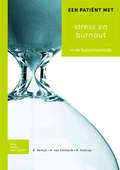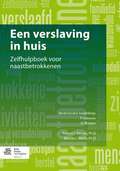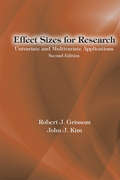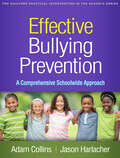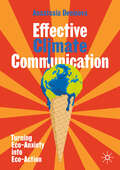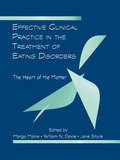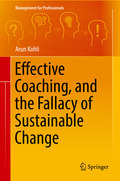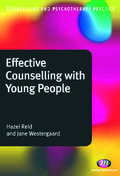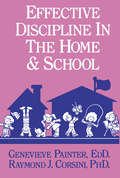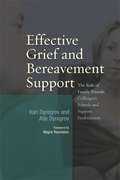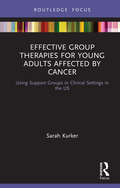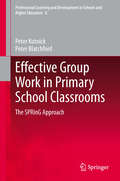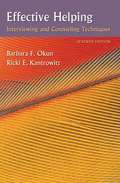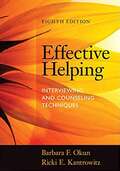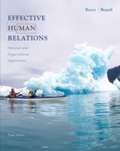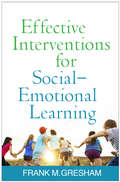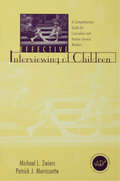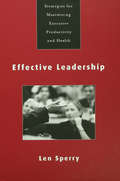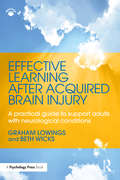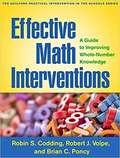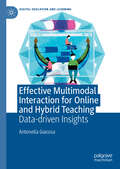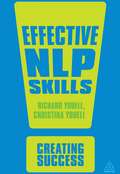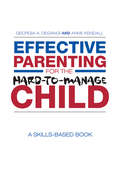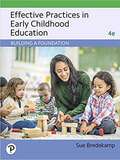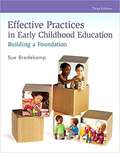- Table View
- List View
Een patient met stress en burnout
by A.A.P. Emmerik van B. Verkuil'Een patient met stress en burnout' laat zien hoe je als arts omgaat met een patient die in zo'n situatie terecht is gekomen. De auteurs beschrijven hoe gedachten het gevoel beïnvloeden en geven diverse technieken waarmee de patient kan ontspannen en controle leert houden over zijn gedachten. De praktische tips en oefeningen uit dit boek helpen zo om ongezonde stress te verminderen en het leven (weer) in balans te brengen.
Een verslaving in huis: Zelfhulpboek voor naastbetrokkenen
by Brenda L. Wolfe Robert J. MeyersDit boek helpt de omgeving van een verslaafde hun eigen welzijn te verbeteren en geeft aanwijzingen hoe zij de verslaafde kunnen laten ervaren dat de omgeving onder de verslaving gebukt gaat en minder zou lijden als van verslaving geen sprake is. Dit principe is gebaseerd op de CRAFT-methode (Community Reinforcement and Family Training) die wetenschappelijk bewezen is. De methode geeft je tools in handen om meer interactie te hebben met de verslaafde, bepaalde patronen te veranderen en samen tot betere resultaten te komen, en uiteindelijk een gelukkiger leven.
Effect Sizes for Research: Univariate and Multivariate Applications, Second Edition
by Robert J. Grissom John J. KimNoted for its comprehensive coverage, this greatly expanded new edition now covers the use of univariate and multivariate effect sizes. Many measures and estimators are reviewed along with their application, interpretation, and limitations. Noted for its practical approach, the book features numerous examples using real data for a variety of variables and designs, to help readers apply the material to their own data. Tips on the use of SPSS, SAS, R, and S-Plus are provided. The book's broad disciplinary appeal results from its inclusion of a variety of examples from psychology, medicine, education, and other social sciences. Special attention is paid to confidence intervals, the statistical assumptions of the methods, and robust estimators of effect sizes. The extensive reference section is appreciated by all. With more than 40% new material, highlights of the new editon include: three new multivariate chapters covering effect sizes for analysis of covariance, multiple regression/correlation, and multivariate analysis of variance more learning tools in each chapter including introductions, summaries, "Tips and Pitfalls" and more conceptual and computational questions more coverage of univariate effect sizes, confidence intervals, and effect sizes for repeated measures to reflect their increased use in research more software references for calculating effect sizes and their confidence intervals including SPSS, SAS, R, and S-Plus the data used in the book are now provided on the web along with new data and suggested calculations with IBM SPSS syntax for computational practice. Effect Sizes for Research covers standardized and unstandardized differences between means, correlational measures, strength of association, and parametric and nonparametric measures for between- and within-groups data. Intended as a resource for professionals, researchers, and advanced students in a variety of fields, this book is also an excellent supplement for advanced statistics courses in psychology, education, the social sciences, business, and medicine. A prerequisite of introductory statistics through factorial analysis of variance and chi-square is recommended.
Effective Bullying Prevention: A Comprehensive Schoolwide Approach (The Guilford Practical Intervention in the Schools Series)
by Adam Collins Jason HarlacherGoing beyond other bullying prevention resources, this book presents an approach grounded in evidence-based best practices, together with concrete guidance for weaving it sustainably into the fabric of a school. The authors describe a range of ways to support the development of prosocial skills in K–12 students, make data-based decisions to respond to bullying, and build partnerships across students, staff, and families. Of crucial importance, the book explains how to ensure that bullying prevention efforts are implemented with fidelity and do not fade away over time. An in-depth case study illustrates what effective implementation looks like in the school setting. The large-size format facilitates photocopying; reproducible tools to support implementation can be downloaded and printed for repeated use. This book is in The Guilford Practical Intervention in the Schools Series, edited by Sandra M. Chafouleas.
Effective Climate Communication: Turning Eco-Anxiety into Eco-Action
by Anastasia DenisovaThis book explores the urgent challenges of communicating climate change in the media. While many books have been written about climate change, this book goes to the very heart of what makes humans care about stories enough to act. In a direct and sympathetic approach, Denisova tackles problems of greenwashing, news narratives, colonial framings and more. Taking climate anxiety as a starting point, the author positions herself with empathy and asks the question: ‘what slows down citizen action?’ This fresh perspective acknowledges the pressing challenge of public disengagement and the anxiety people feel when faced with increasingly bleak headlines as the climate crisis intensifies. There is a surprising challenge to apocalyptic storytelling and a hero’s narrative, which Denisova argues are counter-productive, while solutions are provided for media storytellers. This book is essential reading for anyone seeking to ease climate-related anxiety and foster a deeper sense of empowerment in their audience.
Effective Clinical Practice in the Treatment of Eating Disorders: The Heart of the Matter
by Margo Maine William N. Davis Shure JaneThis book is the first to address what really happens behind closed doors during eating disorders treatment, as most writing has only addressed theoretical approaches and behavioral strategies. The field has long needed a book that describes the heart of the matter: the therapeutic interventions and interactions that comprise life-changing treatment for this life-threatening disorder. In response to this need, the authors have created a book that reflects the individual therapeutic skills and the collective wisdom of senior clinicians, all of whom have years of experience treating anorexia, bulimia, and binge eating disorder. Intended to be a deeply thoughtful and instructive volume, Effective Clinical Practice in the Treatment of Eating Disorders: The Heart of the Matter demonstrates the depth, complexity, and impact of the therapeutic process. In particular, the book articulates and explores essential points of information, issues, insights and unresolved questions about eating disorders treatment. Effective Clinical Practice in the Treatment of Eating Disorders describes and explicates important treatment issues and themes in a nuanced, highly contextualized and qualitative manner. The book offers a significant reference for both novice and seasoned therapists, and it includes specific information that will serve to inform and mentor future generations of eating disorders clinicians.
Effective Coaching, and the Fallacy of Sustainable Change
by Arun KohliThis book presents an evidence-based discussion of two critical areas that are gaining importance in the business world and personal development alike: namely, coaching and being a coach. Does coaching work? If so, then for whom does it add value and what is it really all about? Today, just about everybody in personal services seems to have become a coach. Is it just another modern expression or a buzzword for something that other disciplines were already providing? This book seeks to arrive at clear answers to these questions, providing a thought-provoking and insightful narrative that is likely to leave behind a lasting impact on the industry and its potential clients.
Effective Counselling with Young People (Counselling and Psychotherapy Practice Series)
by Hazel Reid Jane WestergaardThis book examines key theoretical counselling perspectives and applies these specifically to work with young people. It establishes how to build counselling relationships in order to support young people and enable them to achieve positive outcomes and to manage their lives effectively. It also identifies the key counselling skills needed to engage in purposeful, helping conversations. There are sections on understanding adolescent development, exploring person-centred principles and understanding and using motivational interviewing - all of which help to blend academic theory with the realities of practice.
Effective Discipline In The Home And School
by Raymond J. Corsini Genevieve PainterThis book assists parents, teachers, and counselors in training children so that home and school will be happy and efficient, organized but pleasant -- with adults satisfied with their children and children growing up to be respectful, responsible, and resourceful. It provides solutions and emphasizes practicality.
Effective Grief and Bereavement Support: The Role of Family, Friends, Colleagues, Schools and Support Professionals
by Atle Dyregrov Kari Dyregrov Magne Raundalen` ...a profoundly significant book on a topic rarely discussed and little researched, dealing with sudden or unexpected death. The authors have brought together the latest knowledge in the field, and explore how social networks and professionals working with the bereaved can help. This is an important book for all of us, who will sadly one day experience this... it is a must read for those in the field and those suffering.' - Cary L. Cooper, CBE, Distinguished Professor of Organizational Psychology and Health, Lancaster University `It is nothing short of impressive. Yes, more than impressive, because the down-to-earth nature of the studies and the reader-friendly presentation makes this textbook a gift to us all. And by all of us, I do in fact mean all.' - From the Foreword by Magne Raundalen Effective Grief and Bereavement Support shows how social networks, whether they be friends, colleagues or family, can provide an important source of support following sudden bereavement. Individuals in social networks surrounding bereaved people often feel very uncertain about how best to offer support following the death of someone close. As a result of this, people often find that their relationships with friends and family suffer in the wake of bereavement. Kari and Atle Dyregrov provide concrete, evidence-based advice about how support processes can be improved. Issues covered include common reactions to grief, problems that can arise within families as a result, when to involve professional assistance, how to help bereaved children, and the main principles for effective network support. This book will be essential reading for counsellors, psychologists, psychiatrists, social workers, priests, police, community doctors, hospital staff and teachers, as well bereaved families and those who support them.
Effective Group Therapies for Young Adults Affected by Cancer: Using Support Groups in Clinical Settings in the US (Explorations in Mental Health)
by Sarah F. KurkerOutlining the unique psychosocial and development issues faced by young adults affected by cancer, this text draws on qualitative data from two pilot studies conducted in the US to illustrate how the needs of this often overlooked population can be effectively met via group therapy in clinical settings. Drawing on 25 years of experience as a licensed clinical social worker supporting pediatric and young adult cancer patients and their families, Kurker focuses on the role of the clinician in structuring support group sessions. Chapters draw on patient perspectives to demonstrate effective application of interventions to help adolescents work through trauma associated with a diagnosis of cancer, treatment, recovery, and the impacts on their development. Outcomes from these studies also include strategies for selecting support group participants, structuring group activities, and securing funding. Effective Group Therapies for Young Adults Affected by Cancer will be a valuable text for oncology social workers and clinicians involved in adolescent support services. In addition, researchers and postgraduate students with an interest in the fields of social work, psychology, and adolescent development will find the book of interest.
Effective Group Work in Primary School Classrooms: The SPRinG Approach
by Peter Blatchford Peter KutnickThis book offers a challenge to traditional approaches to classroom teaching and pedagogy. The SPRinG (Social Pedagogic Research into Groupwork) project, part of a larger research programme on teaching and learning funded by the Economic and Social Research Council (ESRC), was developed to enhance the learning potential of pupils working in classroom groups by actively involving teachers in a programme designed to raise levels of group work during typical classroom learning activities. Internationally, the SPRinG project is the largest evaluation of effective group working methods in comparison to traditional teaching, with findings that show raised levels of pupil achievement and a doubling of sustained, active engagement in learning. The opening chapters present arguments regarding the relationship of social interaction and children's cognitive development and examine theories that explain why social interactional processes should be integrated into primary school pedagogic practices. Next, the book describes the conceptual and methodological basis for the SPRinG studies, especially its focus on the relational approach, the type of involvement of teachers and classroom planning. Further chapters present key results and describe the background and methods used to establish SPRinG-based effects on pupil progress in mathematics, literacy and science, including both macro and micro assessments; how the SPRinG approach affected pupil-pupil interactions and teacher-pupil interactions, as measured by systematic on-the-spot observations and analyses of videotapes of groups working on specially designed tasks work; and effects on pupil self-completed measures of motivation and attitudes to group work. The book also analyses reflections of teachers who have worked with SPRinG: moving from theory to practice as well as adding insights associated with implementing SPRinG principles in schools. Drawing upon developmental psychological, social psychological and classroom research, it develops a new and ambitious social pedagogic approach to classroom learning, with a stress on group work, which will be of interest to researchers, teachers and policy-makers. This book includes contributions from Andrew Tolmie and Ed Baines, who were also involved in the ScotSPRinG and SPRinG projects.
Effective Helping: Interviewing And Counseling Techniques (7th edition)
by Barbara F. Okun Ricki Kantrowitz Jeffrey P. Kahn Anna C. MastroianniWritten for undergraduate and graduate students studying to enter helping professions or others wishing to learn more about the human relations counseling model, Okun (Northeastern U. ) and Kantowitz (Westfield State College) describe how counselors, health care providers, educators, human service workers and others are called upon to provide services that seem to be expanding exponentially as the new millennium grinds on. They detail the nature of the helping relationship, the communication skills helpers need to make connections and maintain helping relationships that meet goals, classical theories such as the psychodynamic, phenomenological, behavioral and cognitive, and current theories such as the feminist and the multicultural. They turn to the main strategies of human relations counseling, apply those strategies, describe crisis theory and intervention, and analyze issues affecting helping such as ethics, personal values and other issues such as reluctant clients. They include material reflecting current practice and new exercises. Annotation ©2007 Book News, Inc. , Portland, OR (booknews. com)
Effective Helping: Interviewing and Counseling Techniques
by Barbara F. Okun Ricki E. KantrowitzLearn the skills and strategies you need to be an effective and empathic helper with EFFECTIVE HELPING: INTERVIEWING AND COUNSELING TECHNIQUES, Eighth Edition. <p><p>Today's helpers must have a wider, more diverse range of knowledge and skills than ever before-including an understanding of culturally diverse human behavior and development, the process of change, the power of contemporary forces, and sound theories and methods of helping and communicating. This clear, applied, and respected book will help you master the skills of interviewing and relationship building to prepare you for the reality of what it's like to be a helper. It's also a resource you'll want to hold onto well into your career.
Effective Human Relations: Personal and Organizational Applications
by Barry L. Reece Rhonda BrandtThis comprehensive text covers the key human relation skills students need to be successful managers in the workplace. Ideal for both two- and four-year programs, Effective Human Relations uses an organizational perspective to help students understand the disparate factors that influence employee behavior. The Tenth Edition focuses more directly on chapter objectives, establishing them around the seven themes of the text--communication, self-awareness, self-acceptance, motivation, trust, self-disclosure, and conflict resolution--so that the students absorb and connect the concepts. New areas of coverage include goal-setting principles; root causes of negative attitudes; introduction of the Reiss Profile instrument used to classify our basic desires; the use of "branding" to achieve greater visibility in a crowded job market; discrimination based on a person's religious preference; new ways to classify various forms of technostress; and new support for the importance of emotional intelligence. Throughout the text, major themes are supported by a multitude of real-world examples and emotional intelligence checkpoints.
Effective Interventions for Social-Emotional Learning
by Frank M. GreshamThis book reviews evidence-based, multi-tiered practices for promoting social-emotional learning (SEL) with typically developing students as well as those with special needs. Leading authority Frank M. Gresham, codeveloper of the Social Skills Improvement System--Rating Scales, describes how to systematically assess K-12 students' social skills and plan and implement universal, selected, and intensive interventions. His approach is grounded in cutting-edge research on social-emotional competencies and their role in adjustment and academic achievement. Emphasizing what works, the book showcases programs and strategies that are sequenced, active, focused, and explicit. Detailed case examples and lesson plans illustrate different levels and types of SEL intervention. Reproducible assessment tools can be downloaded and printed in a convenient 8 1/2" x 11" size.
Effective Interviewing of Children: A Comprehensive Guide for Counselors and Human Service Workers
by Patrick J. Morrissette Michael ZwiersFirst published in 1999. Routledge is an imprint of Taylor & Francis, an informa company.
Effective Leadership: Strategies for Maximizing Executive Productivity and Health
by Len SperryThis book will interest clinicians who have wondered what professional practice would be like in the corporate setting and want to learn more about the psychological and organizational dynamics that 'drive' executive behavior. Based on the premise that leadership effectiveness is a function of both leader productivity and health, this book reviews the latest information and research data and offers case studies to illustrate specific strategies for maximizing executive health. Len Sperry has been consulting to executives and organizations for 30 years and has written numerous articles and several books on executives and workplace dynamics.
Effective Learning after Acquired Brain Injury: A practical guide to support adults with neurological conditions
by Beth Wicks Graham LowingsEffective Learning After Acquired Brain Injury provides clear guidance on delivering productive educational programmes for adolescents and adults with acquired brain injury (ABI). Written for the non-specialist, the book provides an accessible overview of the neuropsychological deficits resulting from ABI and the ways in which these can affect an individual’s ability to learn and to benefit from educational programmes. This is the first book of its kind to focus on the adaptation of educational programmes for adults rather than children. The authors explain how to take the results of a neuropsychological assessment as a guide in order to construct a cognitive profile and to create individually tailored educational plans and rehabilitation programmes. They also describe specific strategies that can be taught or utilised, and ways in which they can be set out in a simple plan. The book includes an extensive collection of resources which can be reproduced for the reader’s own use. Effective Learning After Acquired Brain Injury will be an invaluable resource for general facilitators, clinicians and practitioners who provide educational opportunities in rehabilitation centres for individuals with a variety of neurological conditions, and also for those delivering education in forensic settings. It will maximise the quality of teaching, and the person’s potential to learn, and improve the success rate of rehabilitation programmes and those aimed at reducing offending.
Effective Math Interventions: A Guide To Improving Whole-number Knowledge
by Robert J. Volpe Robin S. Codding Brian C. PoncyBuilding foundational whole-number knowledge can help put K-5 students on the path to academic success and career readiness. Filling a gap for school practitioners, this book presents step-by-step guidelines for designing and implementing classwide, small-group, and individual interventions for mathematics difficulties. Effective procedures for screening, assessment, intervention selection, and progress monitoring are described and illustrated with detailed case vignettes. In a convenient large-size format, the book includes 20 reproducible handouts and forms. Purchasers get access to a Web page where they can download and print the reproducible materials. This book is in The Guilford Practical Intervention in the Schools Series, edited by Sandra M. Chafouleas.
Effective Multimodal Interaction for Online and Hybrid Teaching: Data-driven Insights (Digital Education and Learning)
by Antonella GiacosaThis book provides educators (including but not limited to those at university level) with data-driven insights into video-mediated interaction. Drawing on extensive research on classroom interaction from a variety of theoretical and analytical perspectives, including four years of observing online university courses that began during the Covid-19 pandemic, the author provides deep insights into video-mediated interaction by comparing direct classroom observations with data provided by teachers and students via online questionnaires. The book clarifies how the newly experienced classroom contexts differ from traditional online and blended classes, then draws on the extensive experience of video-mediated instruction in terms of teacher-learner, learner-content, and learner-learner interaction to decipher what can be challenging and promising about interacting via a screen, specifically addressing multimodal interaction. It also provides practitioners with data-driven suggestions from the perspective of teachers and learners for improving teaching and learning in modern video-based educational contexts that are consistently different from the pre-pandemic idea of e-learning. This book will be a valuable resource for researchers in Applied Linguistics, Language Education and Higher Education more broadly, teachers in higher education institutions worldwide, and teacher education and training and institutional bodies responsible for improving teaching facilities.
Effective NLP Skills
by Richard Youell Christina YouellNeuro Linguistic Programming (NLP) is one of the most powerful communication tools available. It helps you understand what makes people tick, helps you to influence and persuade people and gives you an insight into what really happens when we communicate. Effective NLP Skills, 2nd edition, covers all the NLP models, tools, skills and behaviours you need, and teaches you how to channel this knowledge into improving your performance at work. You will discover how to manage yourself and others, how to use language to get what you want, outcome thinking, how to build rapport and how to motivate others. With crucial insight into the workings of the brain and essential techniques to enhance your learning, Effective NLP Skills is for anyone who wants to utilise the NLP model to get ahead in their career.
Effective Parenting for the Hard-to-Manage Child: A Skills-Based Book
by Georgia A. DeGangi Anne KendallEffective Parenting for the Hard-to-Manage Child is a skills-based book for parents who need practical advice from experts, without all the jargon and generalizations. The book provides specific strategies and techniques for children who are intense, highly reactive, and unable to self-calm. It integrates various treatment approaches in a clear and accessible manner, and offers the "best kept secrets" from the fields of mental health and occupational therapy. The book emphasizes key concepts and everyday activities that will help children take charge of their problems, and it is an invaluable resource for any parent faced with the challenge of a hard-to-manage child.
Effective Practices In Early Childhood Education: Building A Foundation
by Sue BredekampProvide the building blocks for understanding effective practices in early childhood education Inspired by her own classroom experiences, Sue Bredekamp designed Revel Effective Practices in Early Childhood Education: Building a Foundation to empower a new generation of teachers who can make a difference in children’s lives. An entire chapter introduces readers to developmentally appropriate practices (DAP) for early childhood education. Subsequent chapters are organized according to the NAEYC guidelines, which Bredekamp has co-authored for over 30 years. Building on the DAP framework, Bredekamp focuses on three themes that are essential to quality teaching: intentional teaching, developmentally appropriate curriculum, and evidence-based, effective practices. The 4th Edition introduces a new theme, the importance of developing children’s executive function, self-regulation, and positive approaches to learning. Expanded discussions of ways to support and protect the role of play in children’s education, a completely revised chapter on STEM teaching and learning, and a greater focus on culturally responsive curriculum keep readers up to date on the dynamic field of early education. <p><p> Effective Practices in Early Childhood Education, 4th Edition is also available via Revel™, an interactive learning environment that enables students to read, practice, and study in one continuous experience.
Effective Practices In Early Childhood Education: Building A Foundation
by Sue BredekampREVEL is Pearson’s newest way of delivering our respected content. Fully digital and highly engaging, REVEL replaces the textbook and gives students everything they need for the course. Informed by extensive research on how people read, think, and learn, REVEL is an interactive learning environment that enables students to read, practice, and study in one continuous experience—for less than the cost of a traditional textbook. Early childhood authority, Sue Bredekamp, designed Effective Practices in Early Childhood Education: Building a Foundation to prepare a new generation of teachers who can make a difference in children’s lives and education. Written with a clear and engaging presentation, this intriguing text provides the building blocks for understanding developmentally appropriate, effective practices in early childhood education. Bredekamp shows how effective teaching practices can make a difference in the lives of young children by focusing on three key themes: intentional teaching, challenging and interesting curriculum, and evidence-based, effective practices. The Third Edition is updated with the latest research impacting policy and practice to help teachers thrive in the dynamic field of early education. NOTE: Before purchasing, check with your instructor to ensure you select the correct ISBN. Several versions of Pearson's products exist for each title*, and registrations are not transferable. In addition to the access card included in this package, you will need a course invite link, provided by your instructor, to register for and use REVEL. Used books, rentals, and purchases made outside of Pearson If purchasing or renting from companies other than Pearson, the access code for REVEL may not be included, may be incorrect, or may be previously redeemed. Check with the seller before completing your purchase. * REVEL features such as embedded videos, exercises, and quizzes are only available in the REVEL format. They are not available in third-party eTexts or downloads.
